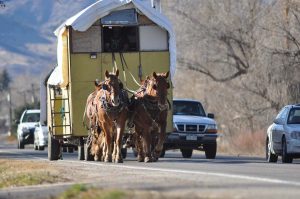Support Northern Colorado Journalism
Show your support for North Forty News by helping us produce more content. It's a kind and simple gesture that will help us continue to bring more content to you.
BONUS - Donors get a link in their receipt to sign up for our once-per-week instant text messaging alert. Get your e-copy of North Forty News the moment it is released!
Click to DonateSometimes a seemingly chaotic world falls perfectly into place. And sometimes the pace of that “place” is very, very slow. Allow me to explain.
Heading down Highway 287 near Owl Canyon with my husband, I was bemoaning my lack of career leads. No new story ideas, no good ideas for expanding my graphic design business. Just what was I going to do?
 [/media-credit]
[/media-credit]Around the next bend, we happened upon a plywood-covered wagon hugging the right shoulder of the highway, pulled by four big chestnut horses trotting in perfect unison.
Was this a hallucination? A blip in the fabric of time? Most importantly, was this a story?
A hand-painted sign on the back of the wagon asked for donations of beet pulp and hay. Well, I did know where to get some beet pulp. The chaos began to coalesce: I was going to make friends with this guy.
After dropping off my husband, I raced over to Ranch-Way Feeds. The covered wagon was already news in the Fort Collins retailer, but nobody knew much about the time-traveler headed into town. Ranch-Way Feeds owner Bonnie Szidon graciously bested the beet pulp by donating 50 pounds of All*American Horse Feed. I raced back up the highway to befriend what would turn out to be a very untypical stranger.
Just north of Ted’s Place, battered by cold November winds and having to park and run — feed sack and all — to catch up, I made the acquaintance of Lee the Horse Logger, who’s been driving his horses across the country from Massachusetts to Oregon and back again since 2006.
A sit-down
The next day at Vern’s restaurant, out of the wind and in the company of hash browns, coffee and pancakes, Lee talked about life at a horse-drawn pace.
Lee is bearded, big-bellied and well-spoken. He does not give his last name. While every inch the defiant curmudgeon that I had expected, Lee’s thoughtful disdain for today’s society is intelligently supported. He seems to have an opinion on just about everything. There are rumors of a degree from Cornell University and an incomplete Ph.D.
Lee expounded on the excessive speed that most of humanity maintains in order to live the most ordinary lifestyle. I thought about how I’d raced around in my Toyota the day before to catch up with him and realized that all that speed would not have met his approval. He will be there when he gets there and call it “on time.” He has never paid an electric bill and hasn’t had running water in many years.
Lee’s preferred brand of horse power is a breed of draft horse called the Suffolk Punch. A rare breed of English origin, the Suffolk was first referred to as a distinct breed in 1771, but had already been known, even then, as “The Old Breed.” It is almost certainly the oldest existing breed of draft horse to have originated in England.
The Suffolk is a rare breed and survives in only small numbers in various countries throughout the world. While most of today’s best known draft horses date back to the war horses of medieval times, the Suffolk was developed by the farmers of eastern England in the counties of Norfolk and Suffolk. Lee owns four of these rare horses: Tom, his first and oldest Suffolk, Max, Dink and Fey. The names get considerably saltier as Lee insists to these giants of the horse world that he’s really the boss.
And these horses eat a lot. In a single day, they will consume 50 pounds of hay, 60 pounds of oats and a bag of beet pulp. Lee’s team pulls 12,000 pounds when the wagons are fully loaded, which means that each horse is pulling twice its body weight. Lee is expecting to acquire two more of these giants when he stops in Nunn.
“The horses are happier when there are six of them,” says Lee. “It means that each one is pulling less weight.”
Donations along the way
While Lee’s logging contracts pay for much of the upkeep for the horses, donations are very important to his cross-country travels. Fortunately, Lee manages to attract many friends, including the folks at the Poudre Valley Co-op, who have been helping Lee for about three years with horse feed, fresh water and a place to camp.
Many of Lee’s friends are quite devoted, including Marti Dodge, a 75-year-old woman who drove down from Rawlins, Wyo., to visit him at the co-op. She and her husband have also met up with Lee in Oregon and Montana. They help him in whatever way they can and are happy to do it, including those rare times when he’s had to ask for cash.
Lee has been tracked by CBS for about eight months and appeared on CNN. Advance publicity has been very important as it keeps him and his team safer on the road and more likely to receive the donations he needs and information about where it would be safe to park his team.
This freewheeling lifestyle has its price. The backbreaking logging jobs, have taken their toll. Health issues are hinted at, but not described in detail. In fact, Lee will expound on any subject except himself. He always seemed to get me to talk about myself instead of the other way around. The Lee that is right in front of you, at that moment, is all the Lee you get.
After Nunn, Lee plans to head south into Denver via the side roads east of the Interstate 25 corridor, and the agenda includes a visit — hitch and all — to the State Capitol. My intention is to keep in touch and to notify TV and newspapers along his trek where he will be and when. His story is irresistible, after all. It’s the story of a man who claimed the right to his own definition of life.
Read more about Lee at www.leehorselogger.com.

